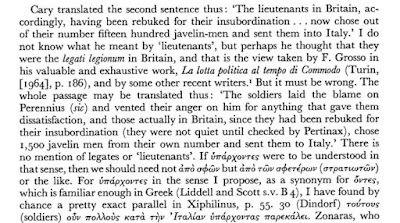'ARMORICOS' has to go as a proposed reading for the ARM[...]S of the L. Artorius Castus memorial stone.
Why?
Why?
Well, after studying the possibility for the last few years, consulting every good source and scholar I could on the subject, it has become clear that the only way to allow such a reading is to literally CONVERT Cassius Dio's account of the 1500 spearmen who marched to Rome into something other than what it is.
From early on, there has been a tendency among those who favor such a conversion to talk in generalities, or to concentrate on a few sparse literary references or scant archaeological remains in an effort to support their argument. I have myself tried to make use of such a method to promote ARMORICOS on the Castus stone.
Unfortunately, the more I inquired about the viability of ARMORICOS, and the more I wrote down the conclusions of my research, the less and less attractive the proposed reading became. Some recent examples of blog posts on the subject:
So here's the problem, in a nutshell:
There is nothing in Dio's account of the 1500 spearmen to suggest their involvement in the Deserters' War. Nothing whatsoever. That being the case, if we take the account seriously, we find that we can adequately explain how it may have come about. While he is probably wrong on a couple of details, John S. McHugh in his book COMMODUS: GOD AND GLADIATOR does a good job of making this mission to Rome by the British soldiers more plausible:
Only one point needs to be addressed here, really, concerning McHugh's analysis of the march of the 1500. It is no longer believed that the language used by Dio designates lieutenants in the sense of legates. This was covered in a by now well-known article that shows we are not necessarily talking about legates per say:
However, this is actually a bit of a moot point. For if the legates were removed, and this force is coming to Rome in part to complain about that removal, then the ex-legates may themselves still be leading the force. They could not call themselves legates and neither could Dio!
But to return to the flaws inherent in the ARMORICOS reading. Professor Roger Tomlin is quite right when he says that Castus would never have said he was going against Armorica itself, as an entire region, if he were simply being sent against some deserters and their ragtag army. He would have said against desertores or praedones or latrones or hostes publicos or rebelles, etc. And he would have added a geographical determinant. So, "against desertores in Armorica." Or against desertores in Gaul, Germany or Spain (as they were certainly in the first two provincial groups, and in the third if Herodian can be trusted on this score). Had Castus led his legionary detachments in Britain instead of on the Continent, he could have simply said 'desertores' or the like, and it would be assumed the action had been taken in his own province. [No, ARMATOS does not work in this context, for all the many reasons that have already been provided - reasons which are supported by the academic community.]
Thus, 1) if we can easily explain how the march of the 1500 spearmen to Rome happened, 2) there is nothing in that account that we can associate with military action taken by that force in Armorica and 3) Castus would not have referred to such military action as being against Armorica, there is no basis for us to continue to support the argument that ARMORICOS is a preferred or even likely rendering for the ARM[...]S on the Castus memorial stone.
ARMENIOS must now stand alone as the best candidate for ARM[...]S.





No comments:
Post a Comment
Note: Only a member of this blog may post a comment.